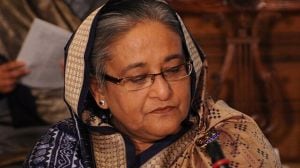Freedom to profess, practise and propagate one’s faith
Twisting and turning, the Prime Minister asks one day for a national debate on conversions, then switches to suggesting that the matter b...

Twisting and turning, the Prime Minister asks one day for a national debate on conversions, then switches to suggesting that the matter be discussed nationally. Why? What has happened that should necessitate any such debate? Only one thing — arson, assault and murder by the very forces that look upon the BJP as their own and look to it to usher in the Hindu Rashtra and the era of Hindutva.
Atal Behari Vajpayee, personally, may not in any way be responsible for the atrocious acts being committed in the name of Hindutva. But, confronted with the spectacle of burnt jhuggies serving as places of worship, and the inaction of a state government run by his own party, the Prime Minister seems to imagine that the answer to this problem of law and order and the violation of constitutional rights is to organise a seminar!
It is this mindset that has led to the brutal assassination of the Australian missionary, Graham Staines, and his two young sons. In the same way that the forces of Hindutva fanned the flames of hatred that led to one psychopath, Nathuram Godse, targeting the Father of the Nation, so has the uncaring attitude of the Prime Minister and the provocative statements of the Home Minister given encouragement to those who have been going for the Christians. It is no coincidence that there has been a huge increase in the attacks on Christians ever since Congress demitted office at the Centre.
The figures and other details have been documented in a chilling report prepared by the United Christian Forum. More significant even than the number and character of these incidents has been their concentration in states run by the BJP. Nine out of ten of these incidents have occurred in the states of Gujarat (easily the worst sinner), where the BJP is in power on its own; Maharashtra, where the behaviour of the BJP’s coalition partner, the Shiv Sena, is more outrageous even than the excesses of the Sangh Parivar; Uttar Pradesh, where the immorality of the BJP’s method of grabbing and staying in power has been compounded by appointing as chief minister a man indicted by the courts for his role in the demolition of the Babri Masjid; and south Bihar, where the BJP is, of course, not in power but from where most constituencies returned BJP MPs in the last Lok Sabha elections. Can this possibly be a mere coincidence?
Of course, there have been incidents in states where the BJP is not in power. The assault on the nuns in Jhabua, Madhya Pradesh, and now the dastardly attack on the Staines family in a remote Orissa village, both occurred in Congress-ruled states. Both governments have taken swift and decisive action against the culprits. There has been no collusion with the forces of disruption, no attempt to find excuses or explanations for their crimes.
There has been no need anywhere but in Gujarat for the Union Home Minister to pull up the state government for casual negligence. In short, the problem over conversions has arisen not because there has been any sudden rise in conversions or because the activities of foreign missionaries have suddenly become alarming, but because the forces of Hindutva have decided to try to make political capital out of targeting a minority.
The Prime Minister needs to be reminded that a national debate over conversions has already taken place. It first took place in the Constituent Assembly when the right to “propagate” one’s religion was explicitly included in the fundamental rig-hts because the Chris-tian community had specifically stated that propagation of the Gos-pel was a sacred duty enjoined in the community by their faith.
It was the colleagues of Mahatma Gandhi, the freedom-fighters who followed him, who incorporated the right to propagate one’s faith into the Constitution. One of the founding fathers, K.M. Munshi, the moving force behind both the Bharatiya Vidya Bhawan and the rebuilding of the Hindu temple at Somnath, was the one who most strongly argued that the Christians and others must be given the right to propagate their faith. The Ramakrishna Mission, the late Osho, the Sivanand Ashram at Rishikesh and Maharishi Mahesh Yogi have been among the most prominent of Hindus to take full advantage of the right to propagate Hinduism in India and abroad. A visitor to almost any Hindu ashram of consequence will routinely see numerous converts to the Hindu faith, including large numbers of white foreigners from western Christian countries.
The right to propagate a religion is a right given to explain one’s religious beliefs. It is not a right given to a missionary to convert; it is a right given to the Indian citizen to change his religion if he wishes to do so. The missionary preaches; it is the individual who converts. This is the significant distinction which the Sangh Parivar, including Atal Behari Vajpayee personally, seek to blur. I hold Vajpayee responsible for this because he very forcefully expressed himself on this question when Parliament did debate this very issue four decades ago.
The right to propagate one’s faith is, of course, not a right to forcibly convert anyone against that person’s will. The Supreme Court has clarified that point. If the state has any evidence of forcible conversion, then the state has a legal obligation to undo such conversion through the courts.
Indeed, now even individuals and non-governmental organisations have the right to file public interest litigation in this regard. What no one has the right to do is associate organisations are doing: threatening Hindus with dire consequences if they dare change their religion or fail to “return home”. That is precisely what must be stopped.
If Graham Staines’ murder, and that of his two small children, does not lead us to that national resolve, we forfeit our right to be regarded as a civilised people.
Aiyar is a Congress party official, but these views are his own



- 01
- 02
- 03
- 04
- 05




























